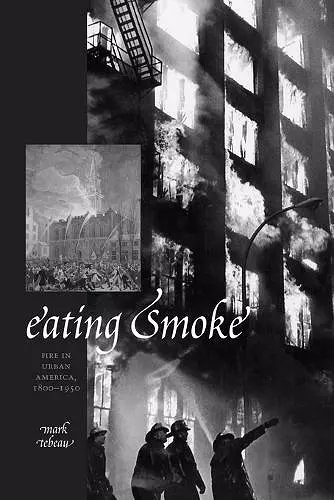Eating Smoke
Fire in Urban America, 1800–1950
Format:Paperback
Publisher:Johns Hopkins University Press
Published:2nd Oct '12
Currently unavailable, and unfortunately no date known when it will be back

Tebeau has interwoven two stories. One charts the changes in firefighting from voluntary organizations to rationalized municipal services; the other moves the fire insurance industry from a focus on observation, to quantification, to prevention of urban fires. Eating Smoke addresses a diverse literature on masculinity, consumerism, and urban and reform history. -- Angel Kwolek-Folland, University of Florida
By comparing the simple skills employed by firefighters-climbing ladders and manipulating hoses-with the mundane technologies-maps and accounting charts-of insurers, the author demonstrates that the daily routines of both groups were instrumental in making intense urban and industrial expansion a less precarious endeavor.During the period of America's swiftest industrialization and urban growth, fire struck fear in the hearts of city dwellers as did no other calamity. Before the Civil War, sweeping blazes destroyed more than 200 million in property in the nation's largest cities. Between 1871 and 1906, conflagrations left Chicago, Boston, Baltimore, and San Francisco in ruins. Into the twentieth century, this dynamic hazard intensified as cities grew taller and more populous, confounding those who battled it. Firefighters' death-defying feats captured the popular imagination but too often failed to provide more than symbolic protection. Hundreds of fire insurance companies went bankrupt because they could not adequately deal with the effects of even smaller blazes. Firefighters and fire insurers created a physical and cultural infrastructure whose legacy - in the form of heroic firefighters, insurance policies, building standards, and fire hydrants-lives on in the urban built environment. In "Eating Smoke", Mark Tebeau shows how the changing practices of firefighters and fire insurers shaped the built landscape of American cities, the growth of municipal institutions, and the experience of urban life. Drawing on a wealth of fire department and insurance company archives, he contrasts the invention of a heroic culture of firefighters with the rational organizational strategies by fire underwriters. Recognizing the complexity of shifting urban environments and constantly experimenting with tools and tactics, firefighters fought fire ever more aggressively - "eating smoke" when they ventured deep into burning buildings or when they scaled ladders to perform harrowing rescues. In sharp contrast to the manly valor of firefighters, insurers argued that the risk was quantifiable, measurable, and predictable. Underwriters managed hazard with statistics, maps, and trade associations, and they eventually agitated for building codes and other reforms, which cities throughout the nation implemented in the twentieth century. Although they remained icons of heroism, firefighters' cultural and institutional authority slowly diminished. Americans had begun to imagine fire risk as an economic abstraction. By comparing the simple skills employed by firefighters-climbing ladders and manipulating hoses - with the mundane...
For the true story of the heroic firefighter's role in urban America, turn to Tebeau's investigative account. University of Chicago Magazine Tebeau develops an interwoven story of gender, class, culture, and technology: contrasting the heroics of working-class firefighters with the rational order of middle-class fire underwriters... An engaging narrative and a fascinating story make this book a rare pleasure-both an academic monograph and a good read. -- Dalit Baranoff EH.Net Emblazed against a historic backdrop of 150 years, Eating Smoke chronicles the parallel development of US firefighting forces and the fire insurance industry. Choice In his ambitious and detailed new book, Eating Smoke, Tebeau sets out to explain the role of two largely undocumented actors-firemen and insurance men-in analyzing, managing, and attacking urban fire... Tebeau's study vigorously opens the way for scholars looking to make sense of the city in the midst of an era of uncertainty and risk. -- Scott Gabriel Knowles Enterprise and Society A rich and highly informative work that deftly uses the 'problem' of urban fire to cast light on a wide array of turn-of-the-century transformations. American Historical Review For business historians its fascination may well lie in its combination of an active physical workforce who were banded together methodically in local pump houses and were tamed by a managerial and bureaucratic set of rules and procedures that were monitored by, if not subjected to, the guidelines of insurers. -- Margaret Walsh Business History In the nineteenth and early twentieth centuries, the destructive power of fire posed a major obstacle to the development of urban America... Eating Smoke is a richly detailed chronicle of the two types of effort to confront and contain this vulnerability: firefighting and fire insurance. -- Carol Chetkovich Journal of Interdisciplinary History Tebeau's ambitious, informative, and absorbing book explains, among many other fascinating things, why little boys want to become firemen and not fire-insurance brokers. -- Carl Smith Business History Review
ISBN: 9781421407623
Dimensions: 235mm x 156mm x 29mm
Weight: 635g
440 pages